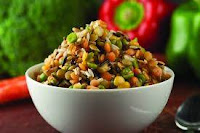Plant-based
foods are the major source of nutrition for people in many parts of the
world because plants are easy to obtain pretty much everywhere that is
not covered in snow and ice all year and are simple to grow - all you
need are seeds, dirt, a little space, and water! How much easier could
it be?
But, if you've ever
looked into trying vegetarianism, you've probably noticed that
"vegetarian" covers a broad range of food choices, some of which aren't
vegetables. Not so easy - and confusing, (particularly if you are having dinner
guests, some of whom happen to be vegetarian) because "GRAVMV" diets (that's "Generally-Referred-to-As-Vegetarian-or-Mostly-Vegetarian" - yes, I made that up) can include
vegetarian, vegan, lacto-ovo vegetarian, vegetarian raw
foods, lacto-vegetarian, fruitarian and pescatarian, flexitarian, and
chickentarian (I did NOT make that up!), as well as “detox”
diets like
juice fasting!
In any case, you've likely surmised that vegetarian diets (generally) exclude meat; and that the definition of “meat-ness” runs the gamut from from "no meat, no animals, no cooked foods, no way, never" to "it's o.k. to eat whatever you want some of the time." So today I'm going to try to clear that up.
 According to the ADA, people who eat a mostly vegetable-based diet are at lower risk for developing heart disease, some kinds of cancers, diabetes, obesity and hypertension. Vegetable foods are rich in macronutrients, and easier on the environment (far less energy required to grow plants than animals), and as long as you get the right balance of foods and nutrients, you can live a long, healthy life on a purely (or mostly) vegetarian diet. For some, purely vegetarian is the "only way to eat;" but not everyone likes, or thrives on a purely vegetarian diet (that bio-individuality thing again). Regardless, incorporating more plant foods into your diet is a GOOD thing to do for your health AND the environment.
According to the ADA, people who eat a mostly vegetable-based diet are at lower risk for developing heart disease, some kinds of cancers, diabetes, obesity and hypertension. Vegetable foods are rich in macronutrients, and easier on the environment (far less energy required to grow plants than animals), and as long as you get the right balance of foods and nutrients, you can live a long, healthy life on a purely (or mostly) vegetarian diet. For some, purely vegetarian is the "only way to eat;" but not everyone likes, or thrives on a purely vegetarian diet (that bio-individuality thing again). Regardless, incorporating more plant foods into your diet is a GOOD thing to do for your health AND the environment. Here are some of the most common "GRAVMV" options:
 Raw Food Vegan: Unprocessed (preferably organic) and uncooked
plant foods only. You can eat fruits,
vegetables, beans, nuts, seeds, and sprouts, but no meat or animal products, or
anything that is cooked above 115 degrees.
Raw Food Vegan: Unprocessed (preferably organic) and uncooked
plant foods only. You can eat fruits,
vegetables, beans, nuts, seeds, and sprouts, but no meat or animal products, or
anything that is cooked above 115 degrees.
The theory is that “living foods” have the best nutrients and energy of
all, and that cooking or in any other way “processing” them reduces their
healthfulness.
Juice fasting is a sub-category of raw food vegan. You
guessed it. You can only DRINK the foods
listed above. If the end-product
requires chewing, it doesn’t count! Just keep in mind that if you are DRINKING
all of your food, you are not getting any fiber, which is another consideration entirely.
Vegan: No animal-based foods of any kind – but you CAN
cook what you’re eating. Vegan usually
also refers to a lifestyle that avoids using any animal products at all (e.g.,
no leather, wool, or anything that was tested on or is made of animals,
either).
Lacto-vegetarian: In addition to fruits, vegetables, nuts,
seeds and legumes, you can have dairy products like yogurt, cheese, milk, etc.
Lacto-ovo vegetarian: Fruits, vegetables, nuts, seeds, legumes,
dairy and eggs. Some people just call
this “plain old vegetarian” or “standard vegetarian” – basically, you can eat anything
that doesn’t include animal (or fish or chicken) flesh.
Now for a few "not-quite-vegetarian-but-still-mostly-vegetarian" types:
Pescatarian: You can eat fruits, vegetables, nuts, seeds, legumes,
fish, and shellfish. No land animals.
Chickentarian (aka
Pollotarian): Fruits, vegetables,
nuts, seeds, legumes, poultry (chicken, turkey, eggs, etc.), are allowed, but no red
meat.
Flexitarian: Mostly plant-based, but you can eat eggs, dairy, meat, poultry, fish, etc. occasionally, and still have the
benefits of vegetarianism. How much you "flex" is up to you, and many people find that going "meatless" once or twice a week is enjoyable, gives you a chance try new foods, and has health benefits. My personal preference is meatless several days a week, but I also enjoy chicken, fish, and meat on occasion.
In upcoming weeks I'll share some of my favorite veggie or mostly veggie recipes and invite you to do the same!
Until next time!
Karen





